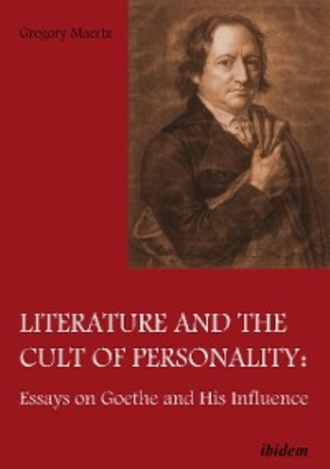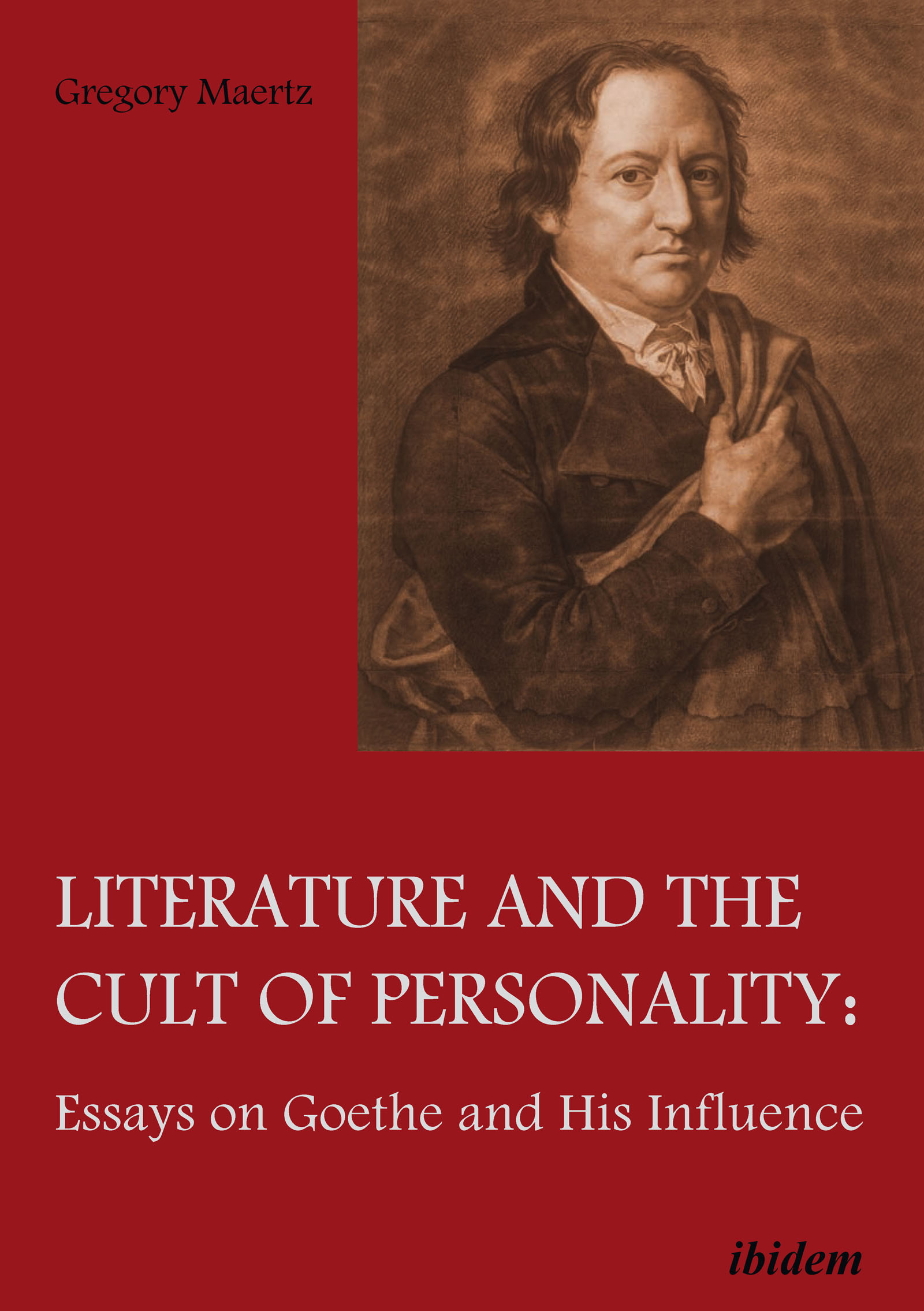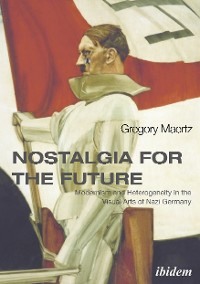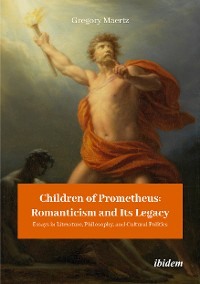
Полная версия
Literature and the Cult of Personality


ibidem Press, Stuttgart
Table of Contents
Acknowledgements
Preface
Prelude Literature and the Cult of Personality: On Goethe’s Influence in Britain
Chapter One Goethe and the Generation of 1789: Cultural Mediation and Literary Enfranchisement
Chapter Two Goethe, the Reception of Kant, and the Romantic Culture War in Britain
Chapter Three The Accidental Intermediary: Henry Crabb Robinson and the Translation of Goethe’s Poetry
Interlude One Goethe and the Romantic Idealization of the Artist
The Importance of Wilhelm Meister
Effusive Responses
Heinrich von Ofterdingen
Wotton Reinfred
St. Leon and Frankenstein
Schopenhauer and Romantic Aestheticism
Chapter Four Resistance and Concealment: Goethe and the Canonical British Romantic Poets
Coleridge and Wordsworth
Shelley and Byron
Byron’s Creative Appropriation of Faust
Chapter Five Thomas Carlyle and the Imitatio Goethe
Interlude Two Cultural Identity and the Transmission of Goethe in New England
Chapter Six The Failure of Romanticism and the Triumph of Realism in Middlemarch: Goethe and the Literary Formation of George Eliot
Postlude De-mythologizing Goethe: George Saintsbury and the Assertion of British Cultural Autonomy
Bibliography
Notes
Acknowledgements
“Besuch im Goethehaus . . . . Der Kustos fordert uns zur Eintragung ins Fremdenbuch auf . . . . Wie ich hinzutrete, finde ich beim Blättern meinen Namen schon mit grosser ungefüger Kinderschrift verzeichnet.”
Walter Benjamin[1]
My research and writing on Goethe and his critics was aided by the following grants and fellowships for which I am grateful: a John D. and Rose H. Jackson Fellowship at the Beinecke Library; a NEMLA Summer Fellowship at the Houghton Library; an ACLS Travel Grant to the Niedersächsische Staats- und Universitätsbibliothek at the Georg-August-Universität Göttingen and to the Goethe- und Schiller-Archiv in Weimar; a Kate B. and Hall J. Peterson Fellowship at the American Antiquarian Society; Membership at the Institute for Advanced Study in Princeton; an NEH Fellowship for University Teachers; a Stipendium from the Gerda Henkel Stiftung; a National Humanities Center NEH Fellowship; an ACLS Senior Fellowship; a Visiting Research Professorship in the Department of Germanic Languages and Literature at Duke University; and research leave awarded by St. John’s University, my home institution.
Matthew Feldman took a special interest in seeing that this book was published. For his generous encouragement, I could not be more thankful. I am also indebted to Bella Muccari for her expert proofreading and for so much more. In addition, I wish to express my thanks for the assistance of Valerie Lange and Florian Bölter at ibidem as well as that of Lana Umali and Antonio Fontana at St. John’s. My work on this book has been fortunate to enjoy the support of colleagues in the English Department and elsewhere at St. John’s, such as C. Scott Combs, Jeffrey Fagen, Amy Gansell, Amy King, John Lowney, Kathleen Lubey, Steve Mentz, and Stephen Sicari. Other names are reference points for the journeys and conversations that propelled the writing of this book: James G. Basker, George Bridge, Frederick Burwick, Caroline H. Cooney, Kevin L. Cope, William C. Donahue, Florence Dore, Kata Gellen, Gerald Gillespie, Ruth V. Gross, Sabine Hake, Geoffrey Harpham, Robin Hemley, Martyn and Jessie Imrie, Martin Kagel, Wynfrid Kriegleder, Timothy Lenoir, Michael McKeon, Elizabeth Mansfield, Jakob Norberg, Thomas Pfau, Barry V. Qualls, Ruben D. Quintero, Jeffrey Sammons, Jane Sharp, Erik Tonning, Kevin Van Anglen, Heinrich von Staden, and Frederick Wegener. Unless otherwise indicated, the translations in the text and notes are my own.
The publication of this book commemorates the mentorship of Erich Heller and Lilian R. Furst during my student days at Northwestern and Harvard. As refugees from Hitler’s Europe, they converted me to the understanding that the life of the mind was first and foremost a German-speaking territory. This book also pays homage to my teachers at Harvard—Walter Jackson Bate, Jerome H. Buckley, James Engell, and David Perkins—whose generosity of spirit, if not their superior learning, I have tried to emulate in my own career.
Highgales, Gravir, The Isle of Lewis
Preface
“Every Goethe text, however divergent from the others, bears the mark of his unique and overwhelming personality, which cannot be evaded . . .”
Harold Bloom[2]
This book argues that the fabrication of Johann Wolfgang von Goethe, the German poet and polymath, as an Anglo-American sage and literary icon was the product of a cult of personality that lay at the center of nineteenth-century intellectual politics. A reconstruction of the culture wars fought over Goethe’s authority in Britain and the United States, a previously hidden chapter in the intellectual history of the period ranging from the late eighteenth century to the threshold of Modernism, is thus the focus of Literature and the Cult of Personality. Marginal as well as canonical writers and critics participated in this process, and the essays that follow offer insight into the mediation activities of Thomas Holcroft, Henry Crabb Robinson, Lord Byron and Percy Bysshe Shelley, Thomas Carlyle, the cream of New England intelligentsia, and George Eliot. For women writers and Jacobins as well as Dissenters, Scots, and Americans, transmitting the works of Goethe to an English-speaking audience emerges as an empowering paradigm of literary development according to which “re-writers” became original writers through an apprenticeship of translation and reviewing.
At the center of this process stands the figure of Carlyle who simultaneously serves as the chief advocate for and embodies the beau idéal of Goethean Bildung or self-realization in Britain. Approaching mid-century, Carlyle’s emphasis on the person of the poet rather than the poetic text—and thus the construction of the Goethean cult of personality—continues and exfoliates in the writings of Carlyle’s epigones and imitators. By reading Goethe’s life experiences and personality as exemplary and worthy of emulation, Carlyle established a pattern that will dominate British and American cultural life throughout the last decades of the nineteenth century. Initially limited to Goethe and German literature, Anglo-American enthusiasm for the German intellect eventually encompasses aesthetics, philosophy, theology, and science.
The voices of Goethe’s opponents—critics writing for The Anti-Jacobin Review as well as more prominent figures such as William Taylor, Samuel Taylor Coleridge, William Wordsworth, Thomas De Quincey, William Hazlitt, and George Saintsbury—are equally well represented in this book. Anticipating the opposition to high theory in the modern academy and the personal attacks on the émigré scholar Paul De Man, who, like Goethe, once served as the mouthpiece of an authoritarian regime, Goethe’s British and American antagonists in the Romantic and Victorian eras, typically cultural nationalists with an inward-looking conservative agenda, seek to construct, preserve, and defend a myth of the self-sufficiency of British literature.
In the diverse and fascinating body of critical writing and translations examined in this book textual exegesis plays an unexpectedly minor role; in its place a full-blown cult of personality materializes along with a blueprint for an ideology of hero-worship that becomes more fully mapped out in the cultural and political life of twentieth-century Europe and early twenty-first century America.
Prelude
Literature and the Cult of Personality:
On Goethe’s Influence in Britain
“Überhaupt, der persönliche Charakter des Schriftstellers bringt seine Bedeutung beim Publikum hervor, nicht die Künste seines Talents.”
Johann Wolfgang von Goethe[3]
“This new generation shared a culture which, largely thanks to Samuel Taylor Coleridge and Thomas Carlyle, was almost as much German in its origins as it was English.”
Rosemary Ashton[4]
In a letter dated 20 July 1827 Goethe responds to a new English-language biography of Schiller sent to him by the young Thomas Carlyle: “Der Koran sagt: ‘Gott hat jedem Volke einen Propheten gegeben in seiner eignen Sprache.’ So ist Jeder Übersetzer ein Prophet seinem Volke” [The Koran says: ‘God has given every people a prophet in their own language.’ Thus each translator is a prophet to his people].[5] In this memorable tribute to the young Scottish author, who had “learned from the Germans to represent literature as the new liturgy,”[6] Goethe offers an assessment of the privileged status of cultural intermediaries in the age he declared was that of Weltliteratur [world literature]. Until Goethe’s death five years later Carlyle played the combined roles of Dolmetscher [interpreter], Übersetzer [translator], and Vermittler [mediator] of German culture in Britain with unflagging zeal. Recognized by Goethe as successor in this endeavor to Walter Scott (1771–1832), he introduced an exegesis of Goethe’s strong personality that made a lasting impression on the intellectual life of mid- to late nineteenth-century Britain and America. The main vehicle for this subversive force was a diverse body of writing, including critical essays, translations, and prefaces that appeared during the most formative decade of Carlyle’s career, 1822 to 1832.
Klaus Doderer has argued that Carlyle’s cumulative critique of Goethe led to a “Vertiefung und eine neue Wendung” [an intensification and a new departure] in the reception of German thought and literature in Britain. “Obwohl gerade Carlyle die German Romance schrieb und Novalis sehr liebte” [although Carlyle published German Romance and very much admired Novalis], he nonetheless put Goethe squarely in the foreground of his meditations on literature, not merely as Germany’s but also as Europe’s leading poet and critic of comprehensive authority. Accompanying the resulting tendency to consider literature, in Doderer’s phrase, “als moralisches Erziehungsmittel” [as a medium of ethical formation], Carlyle placed new emphasis on the “Dichterperson” [the person of the poet] rather than “Dichtung” [poetry].[7] In focusing on the author rather than the work, Carlyle was building upon Germaine de Staël’s suggestive approach in De l’Allemagne [On Germany] (1813) and anticipating Heinrich Heine’s portrayal of Goethe’s imperial persona in Die Romantische Schule [The Romantic School] (1832–1835). As much as these assessments might differ in emphasis and specific detail, all three critics identified Goethe as the dominant cultural phenomenon of the time. Moreover, the technique employed by all three critics consists of a fusion of biography and practical criticism. Staël’s and Carlyle’s interest in Goethe reveal the impact of interpreting Goethe on the formation of national cultural identity in France and Britain. The naming of a foreign writer as the cultural hero in two national literary traditions more mature and advanced than Germany’s reflects the astonishing permeability of national and cultural boundaries in the early decades of the nineteenth century.[8]
Carlyle also presaged Wilhelm Dilthey’s method in Das Erlebnis und die Dichtung [Experience and Poetry] (1905), one of the foundation texts of modern literary hermeneutics. As with Staël (1766–1817) and Heine (1796–1856), both Carlyle (1795–1881) and Dilthey (1833–1911) derived their concepts of the imagination, literariness, authorship, and the function of criticism from an examination of Goethe’s life and works; both critics reached the conclusion that Goethe, perhaps alone of all classic European writers, pursued a life so soaked with meaning that his lived experiences demand to be interpreted for their semaphoric value. It is as if the writer’s life and work formed a palimpsestic unity. The following passage from the second chapter of Dilthey’s book, “Die dichterische Phantasie Goethes” [“The Poetic Imagination of Goethe”], suggests intriguing parallels with Carlyle’s approach in his reverential essays of 1832, “Goethe” and “Goethe’s Works”:
Poesie ist Darstellung und Ausdruck des Lebens. Sie drückt das Erlebnis aus, und sie stellt die äußere Wirklichkeit des Lebens dar . . . . Hieraus erklärt sich, was uns ein lyrisches Gedicht oder eine Erzählung sehen läßt–und was für sie nicht existiert. Die Lebenswerte stehen aber in Beziehungen zueinander, die in dem Zusammenhang des Lebens selbst gegründet sind, und diese geben Personen, Dingen, Situationen, Begebenheiten ihre Bedeutung. So wendet sich der Dichter dem Bedeutsamen zu . . . . Da ist es nun die erste und entscheidende Eigenschaft des Dichtung Goethes, daß sie aus einer außerordentlichen Energie des Erlebens erwächst . . . . Seine Stimmungen schaffen alles Wirkliche um, seine Leidenschaften steigern Bedeutung und Gestalt von Situationen und Dingen ins Ungemeine, und sein rastloser Gestaltungsdrang wandelt alles um sich in Form und Gebilde.[9]
Upon closer examination the comparison with Dilthey seems especially fitting. Indeed, according to Rudolf A. Makreel, Dilthey’s view of literature is biographical “not in the sense of manifesting personal mannerisms, but of revealing a unity of style which derives from the total being of the poet—a being that comprehends more than private states of mind.”[10] Biography as an expression of the organic fusion of style and personality also underlies Carlyle’s hermeneutic as applied to the German author: “Goethe’s poetry is no separate faculty, no mental handicraft, but the voice of the whole harmonious manhood; nay, it is the very harmony, the living and life-giving harmony of that rich manhood which forms his poetry.”[11]
It is a curious feature of the history of the transmission of foreign cultures that in Britain, Goethe’s reputation was not, in contrast to the scene in Russia or France, formed by appropriating or resisting such major texts as Die Leiden des jungen Werthers (1774), Faust (1808 and 1832), and Torquato Tasso (1790). Rather, Goethe’s reputation in Britain grew out of the controversy surrounding his personality, ethics, and character. From the publication of the first English translation of Werther in 1780 to the appearance of Carlyle’s translation of Wilhelm Meister in 1824, the criticism of Goethe in Britain and North America was inflected by a series of conflicting interpretations focused not on readings of these and other works—at least not in the sense indicated by Coleridge’s “practical criticism”—but, quite differently, on what George Saintsbury, in his reappraisal of Goethe’s impact on Victorian critics, derided as “anthropological” interpretations or pre-Freudian probings of the authorial psyche as well as moral judgments which were inferred from the text and then projected back onto the author. A process that Saintsbury complains, had the effect of overshadowing the textual features of the literary work.[12]
The biographical impulse in Carlyle’s criticism was in fact assimilated from Goethe’s own reflections on literature and his practice. In Gespräche mit Goethe [Conversations with Goethe] (1836 and 1848), for example, Eckermann notes the poet’s assertion that
“Allerdings,“ sagte Goethe, “ist in der Kunst und Poesie die Persönlichkeit alles; allein hat es doch unter den Kritikern und Kunstrichtern der neuesten Zeit schwache Personagen gegeben, die dieses nicht zugestehen, und die eine große Persönlichkeit bei einem Werke der Poesie oder Kunst nur als eine Art von geringer Zugabe wollten betrachtet wissen. Aber freilich, um eine große Persönlichkeit zu empfinden und zu ehren, muß man auch wiederum selber etwas sein. Alle, die dem Euripides das Erhabene abgesprochen, waren arme Heringe und einer solchen Erhebung nicht fähig; oder sie waren unverschämte Charlatane, die durch Anmaßlichkeit in den Augen einer schwachen Welt mehr aus sich machen wollten und auch wirklich machten, als sie waren.“[13]
In fact, Goethe’s remarks on literature almost invariably lead to speculations on the psychology or personality traits of leading authors. An example of this approach is recorded by Eckermann as a memorable characterization of Dante on 3 December 1824:
Übrigens sprach Goethe von Dante mit aller Ehrfurcht, wobei es mir merkwürdig war, daß ihm das Wort Talent nicht genügte, sondern daß er ihn eine Natur nannte, als womit er ein Umfassenderes, Ahnungsvolleres, tiefer und weiter um sich Blickendes ausdrücken zu wollen schien.[14]
Among contemporary poets Goethe admired Byron more than any other and in all of his recorded discussions of this prodigious talent, Goethe’s emphasis is, rarely if ever, on the special qualities of the Briton’s works, but more on the force and distinctiveness of his personality. On 24 February 1825 Goethe cited Byron’s importance as the major argument in favor of learning English:
“Er ist ein großes Talent, ein geborenes, und die eigentlich poetische Kraft ist mir bei niemand größer vorgekommen, als bei ihm. In Auffassung des Äußeren und klarem Durchblick verganger Zustände ist er eben so groß wie Shakespeare.”[15]
Indeed, a perusal of the Gespräche mit Goethe, the collected Briefe, and all of Goethe’s criticism confirms that he only rarely discusses a specific work and its literary characteristics; instead, his interest in the writer’s personality nearly always supersedes textual analysis or an explicit discussion of aesthetic qualities. Thus not only does Goethe validate a critical method or hermeneutic based on reading authorial personality, deciphering the allegorical value of his personal history emerges as one of the chief organizing principles in the cultural life of nineteenth-century Europe. The critical response to Goethe displayed in the work of Staël and Hippolyte Taine (1828–1893) of France, Heine and other writers associated with the Jungdeutschland [“Young Germany”] literary movement, and Carlyle and his disciples in Britain, suggests Goethe’s pertinent impact on European intellectuals.
Goethe, who is credited with opening “a new world to him,”[16] is the subject of Carlyle’s first significant appearance in print in April 1822, an article on Faust published in the Edinburgh Review. While this modest little piece was not included in the first edition of Carlyle’s complete works, it marked the beginning of his involvement with Goethe and German culture as critic, translator, and editor, and it reveals that at the outset of his career he tied his literary fortunes to the mediation of Goethe in the English-speaking world. Moreover, on this foundation Carlyle staked his first claim to speak with cultural authority and it is clear that his mature views on art, society, economics, and politics were formed in the crucible of his critique of Goethe and German literature. The process of substituting an emphasis on biography for interpretation of the literary work culminates in Carlyle’s five major statements on Goethe—the “Translator’s Preface to the First Edition of Meister’s Apprenticeship” (1824), “Goethe’s Helena” (1828), “Goethe” (1828), “Death of Goethe” (1832), and “Goethe’s Works” (1832). Textual exegesis plays an unexpectedly minor role in Carlyle’s assessment of Goethe; in its place we find the outline of a full-blown cult of personality and a blueprint for the ideology of hero-worship and submission to authority that is more fully mapped out in such later major works as On Heroes and Hero-Worship (1841), Oliver Cromwell’s Letters and Speeches (1845), and The History of Frederick the Great (1858, 1862, 1864, 1865).
As the product of a strict nonconforming religious upbringing Carlyle was initially repelled by what critics before him had depicted as Goethe’s tendency to condone or represent licentious behavior in his writings. Even his close identification with Goethe from 1822 to 1832 was initially qualified by feelings of ambivalence and even of disgust.[17] Resistance to Goethe from 1822 to 1823 was replaced by sympathy from 1828 to 1832 but only after Carlyle had interpolated his own idiosyncratic, self-reflexive interpretation, according to which Goethe’s writings embody the drama of
a mind working itself into clearer and clearer freedom; gaining a more and more perfect dominion of its world. The pestilential fever of Skepticism runs through its stages; but happily it ends . . . in clearer, henceforth invulnerable health.[18]
Once Goethe’s biography had been configured according to Carlyle’s plot of redemption—and references in his writings to relevant experiences were identified as pivotal—the process of reading his works triggered a rapturous conversion experience: “The sight of such a man” was to Carlyle “a Gospel of Gospels,” which “literally” offered preservation “from destruction outward and inward.” Goethe, he averred, was the first person who had “travelled the steep rocky road” of self-discovery which he, too, had known, and Goethe thenceforth was to be known as “the first of the moderns.”[19] Formerly, as Carlyle confessed in a letter to Goethe, he, too, had been “an Unbeliever . . . storm-tossed in my imagination; a man divided from men; exasperated, wretched, driven almost to despair.” But Goethe had restored his faith in “the Mercy and Beauty of which it is the Symbol” and helped him attain “to new thoughts, and a composure which I should once have considered as impossible.”[20] Thus Goethe played a key role in the development of what W. H. Bruford calls Carlyle’s “humanistic religion” and laid the foundations for the cult of personality surrounding Goethe.[21]
There were, of course, contemporary precedents and parallels for Carlyle’s valorizaton of Goethe’s cultural authority in Britain. Obviously, none was more important than Staël’s De l’Allemagne. Her identification of Goethe as a “living classic” seemed to confirm that a “modern” could indeed be the equal of the “ancients.” Despite bad country roads and a shortage of decent inns, Staël joined the procession of foreign visitors flocking to Weimar, which featured perhaps the most remarkable concentration of literary celebrities in Europe.[22] But even after a long journey her personal interviews with Goethe and Schiller could not alter her ideologically distorted interpretation of German culture.[23] Subjected to strict censorship in Paris, De l’Allemagne was first published in London in 1813. It has been credited with disclosing a contemporary snapshot of the real Germany for the first time to “die ganze Welt” [the entire world].[24] Carlyle found in Staël’s idealized vision of German culture a readily available alternative to the Enlightenment aesthetic consensus associated with the elites of Paris and London from whom he felt alienated. And Carlyle was not alone in coming under the spell of Staël’s portrayal of Germany as the land of poets and thinkers; this picture of German culture dominated British perspectives throughout the nineteenth century and gave impetus to the transformation of Goethe from a foreign reprobate to universal cultural hero.[25] At a time when Goethe’s writings fell short of the popularity shared by those of Kotzebue, Schiller, and Wieland, Staël made the bold claim that Goethe, and not the work of his more accessible and successful contemporaries, “réunit tout ce qui distingué l’esprit allemand” [unites all that distinguishes the German mind] and possessed “les traits principaux du génie allemand” [the chief characteristics of the German genius].[26]
Described by Heine as a “coterie book” and a “kind of salon,” in which a cacophony of voices may be heard crying out from its pages, De l’Allemagne is, indeed a new kind of criticism. René Wellek believed that “the book cannot be judged primarily as a work of literary criticism. It is the picture of a whole nation, a sketch of national psychology and society, and also something of a personal travel book,” and he compared De l’Allemagne to Tacitus’s Germania in its propagandistic intent:



